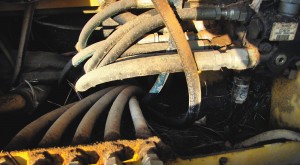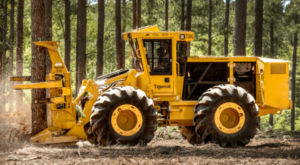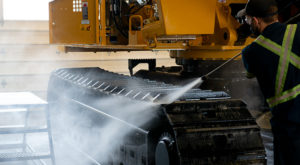Forestry machines – particularly those used in felling and processing applications – constantly work in close proximity to large quantities of combustible organic material. Branches, twigs, bark, leaves and needles falling from surrounding trees, bushes and vines as well as chips and dust thrown from saw heads can enter the engine enclosure of a logging machine as airborne debris.
Engine exhaust temperature often exceeds 425ºC (800ºF). Remember Fahrenheit 451, the dystopian Ray Bradbury novel? Well, like banned books, forest debris will ignite and burn at temperatures of 200-260ºC (400- 500ºF). Consequently, if forest debris makes contact with high temperature engine exhaust components like the manifold, turbocharger or muffler, then the risk of a machine fire is greatly increased.
Once a wood debris fire ignites inside the machine enclosure, many other flammable materials on the machine could interact, rapidly turning a small, localized fire into a raging machine inferno.
These other materials include:
- rubber and plastic hoses
- electrical wiring insulation
- engine oil
- hydraulic oil
- diesel fuel
- engine anti-freeze
The prevention of a logging equipment fire is an ongoing effort. Cleaning, washing and removal of accumulations of forest debris within the machine are important responsibilities and tasks to be completed frequently.
Equally important is the ongoing inspection and maintenance of engine exhaust system components to ensure that all exhaust gases exit the machine only from the exhaust pipe after the muffler. If exhaust leakage occurs anywhere inside the engine compartment, all of the above components and materials are exposed to the high temperature gases. At best, this leads to premature component failure. At worst, it significantly increases the risk of machine fire.
Examination of all engine exhaust components for leaks must be conducted frequently. Always thoroughly inspect for:
- cracked manifolds
- loose or missing bolts
- loose clamps
- leaking gaskets
- loose or missing debris guards and shields
- broken mounting brackets
- rusted or cracked pipes and mufflers
This inspection work should be incorporated into morning warm-up procedures, daily lubrication and maintenance schedules or end-of- shift cool-down checks.
Be proactive
If any exhaust system components appear to be nearing the end of their useful service life, repair or replace the parts before they fail. If an exhaust leak is found, the machine must be shut down immediately and not put back to work until the necessary repairs have been completed.
Listen
A change or increase in the engine exhaust noise level is usually a sign of an exhaust leak. This audible warning cannot be ignored; immediate action is required.
Planned downtime
As machine operating hours accumulate, major service work or engine replacement may be undertaken. Use these opportunities to conduct a thorough examination of the complete engine exhaust system, replacing any marginal components. Machine fires are expensive – more expensive than the time it takes to clean out the machine and inspect the exhaust system on a daily basis and far more expensive than replacement parts.
Machine fires are also largely preventable. So think ahead, be proactive and avoid the long list of associated financial, human and environmental costs. For more information, refer to the Fire Prevention pages in Section 1 of any current Tigercat Operator’s Manual.
Machine design to reduce fire risk
Tigercat designers plan machine layouts with fire safety in mind. Compartmentalization separates the cooling system, engine, and hydraulic components. This reduces the risk of hydraulic oil coming into contact with hot engine and exhaust components in the event of a hydraulic system leak.



